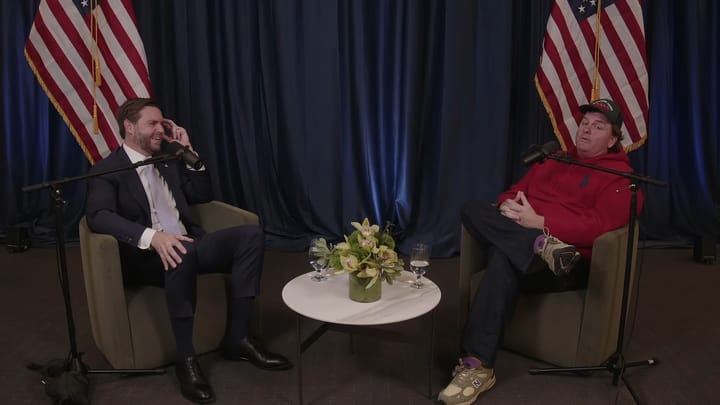The Horatio Sanz Lawsuit Is an Explosive Story About SNL, NBC, and Jimmy Fallon
A few thoughts.
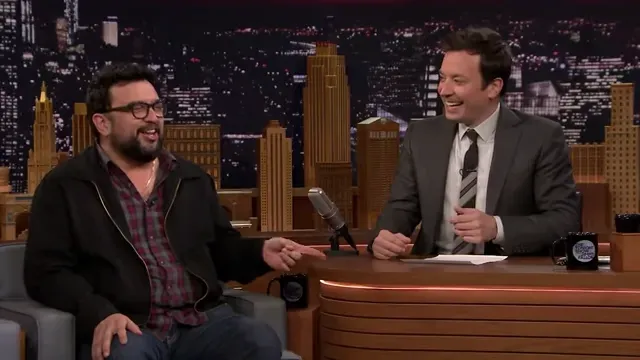
This newsletter discusses allegations of grooming and child sexual abuse. Please skip it if you need to.
Yesterday an anonymous woman filed a lawsuit alleging that comedian Horatio Sanz groomed and sexually abused her 20 years ago, when she was 15 to 17 years old and he was a cast member on Saturday Night Live in his early 30s. The allegations against Sanz—apparently corroborated both by contemporaneous emails and by text messages he sent her in 2019 apologizing for his conduct—are nauseating enough, and they are only the tip of the iceberg. The lawsuit also names SNL and NBC as co-defendants and makes very clear that everyone at the show, including Jimmy Fallon and Lorne Michaels, saw what was happening and did nothing to stop it.
You can read the complaint, filed under a New York law allowing child sexual abuse survivors to sue their abusers past the statute of limitations, here. I don't want to overwhelm you with too many lurid details, but I do want to lay out exactly what is being alleged. Most of the headlines I've seen focus on Sanz, even though this story is about much more than him. I would hate for the breadth of the alleged misconduct to get lost in a news ecosystem that quickly forgets about anyone who's not an A-lister.
According to the complaint, from 1999 to 2002 the plaintiff ran and participated in fan sites dedicated to SNL and Jimmy Fallon. SNL employees and cast members read these fan sites. I will repeat this: SNL's employees and cast members read these fan sites. In January 2000 Sanz and Fallon initiated contact with the plaintiff, then 15, by emailing her from an NBC email address. In October 2000, she and Sanz met after an SNL taping, where he "was flirtatious and physically affectionate with the then 15-year old Plaintiff by kissing her cheek and putting his hands on her waist." By spring of the next year, when she was 16, she was regularly coming to SNL afterparties, where she drank alcohol in the presence of cast members like Sanz, who was physically affectionate with her in the presence of other cast members and staff. During this period he also allegedly messaged her on AIM, soliciting "revealing photographs," discussing sexually explicit topics, and telling her not to tell anyone about their communications. Over time, the complaint alleges, these conversations grew increasingly sexual and controlling. The plaintiff suffered shame and depression for which she eventually sought inpatient treatment.
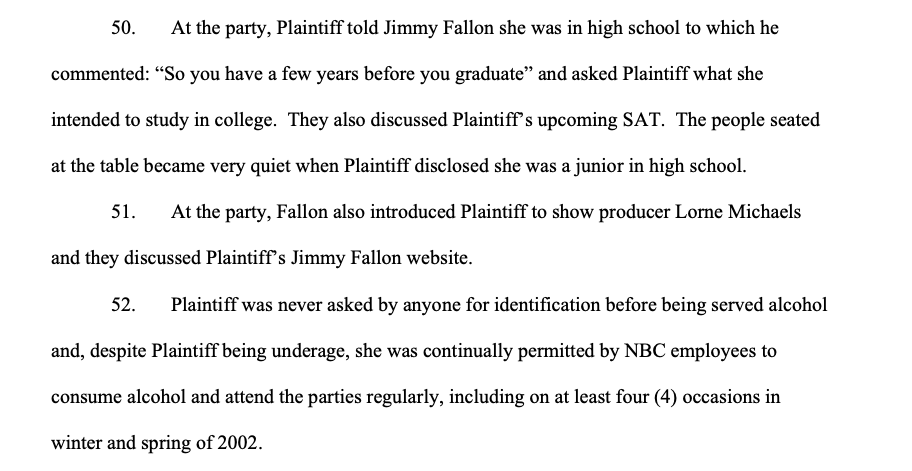
By the fall of 2001 the plaintiff was allegedly a regular on Sanz's afterparty guest list. At these parties she drank alcohol and interacted with other SNL luminaries. At one point she sat and drank a Budweiser beside Jimmy Fallon, who asked her what she planned to study in college. ("The people seated at the table became very quiet when Plaintiff disclosed she was a junior in high school.") Fallon introduced her to Lorne Michaels, who asked her about her fan site devoted to Fallon. At a party at another cast member's loft, Sanz allegedly digitally penetrated her in full view of other NBC employees, one of whom asked him, "Are you fucking serious?" At an afterparty the next week, which Fallon and Sanz let her into, she allegedly drank alcohol while chatting with then-executive producer Mike Shoemaker, who currently produces Late Night with Seth Meyers. She was 17.
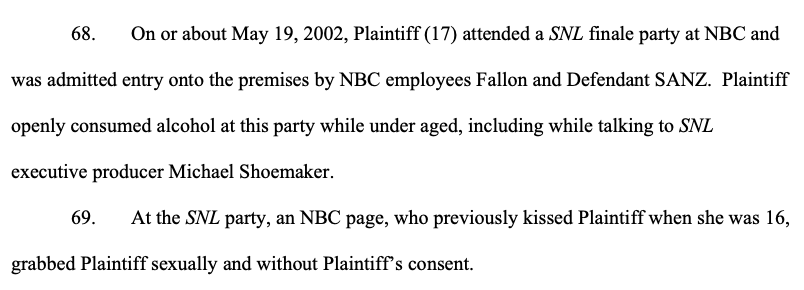
The complaint stresses that Sanz was not the only cast member or SNL employee "who openly preyed upon women and young girls." At the same party where she chatted with Shoemaker, it alleges, she was grabbed "sexually" by an NBC page who had kissed her the previous year. In September 2001, another cast member allegedly harassed her 17-year-old friend. She was also "warned to stay away from another SNL cast member/NBC employee because he sexually assaulted and/or sexually harassed" several of her friends. The complaint offers no details about her friends or these incidents, but it seems relevant that the plaintiff came to SNL by way of a fan site actively monitored by the show's employees. Her allegations give the distinct impression that SNL cast members deliberately sought out young female fans and brought them to parties where booze flowed freely and nobody checked IDs.
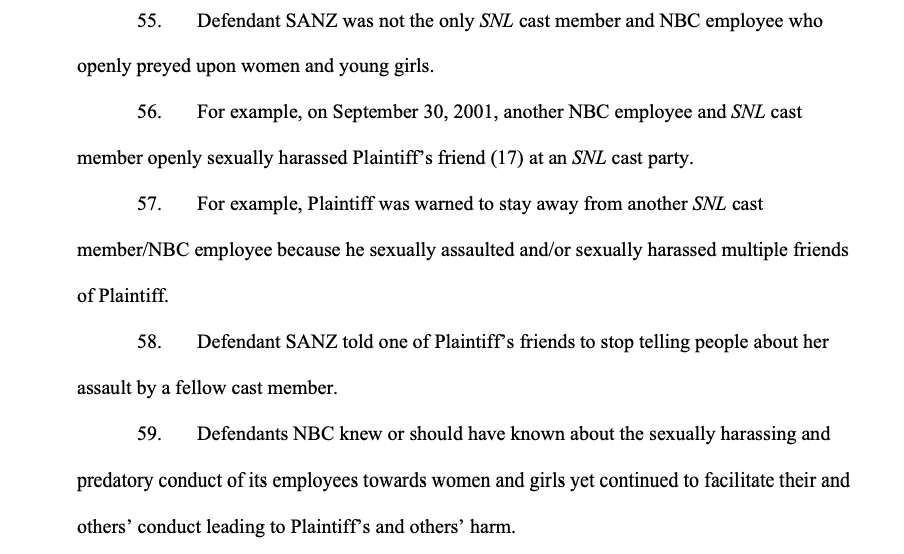
I would be very, very surprised if this lawsuit does not settle quietly. The plaintiff appears to have no shortage of receipts—including the damningly extensive apologies Sanz texted her two years ago—and there are too many people implicated for NBC to let it go to trial. In addition to Michaels, Shoemaker, and Fallon, the potential cast members around to witness Sanz's conduct would have included Will Ferrell, Ana Gasteyer, Darrell Hammond, Chris Kattan, Tracy Morgan, Chris Parnell, Molly Shannon, Rachel Dratch, Tina Fey, Jerry Minor, Maya Rudolph, Amy Poehler, Dean Edwards, Seth Meyers, and Jeff Richards. (Remember, at least two other cast members allegedly harassed the plaintiff's friends.) Then there's the writing staff for those seasons, which included Robert Carlock, Jim Downey, (current SNL producer) Steve Higgins, Michael Schur, Paula Pell, Ken Scarborough, Robert Smigel, Louis CK, Max Brooks, Andrew Steele, and Jack Handey.
These people are not responsible for Sanz's actions—well, except for the ones who were literally his superiors—but to the extent that any of them saw what was happening, they are very much responsible for their own failures to intervene. It takes a village to facilitate this sort of abuse and it takes a village to let the abuser get away. This lawsuit is another reminder of what success in Hollywood's most vaunted institutions requires one to overlook. If only it would be the last.
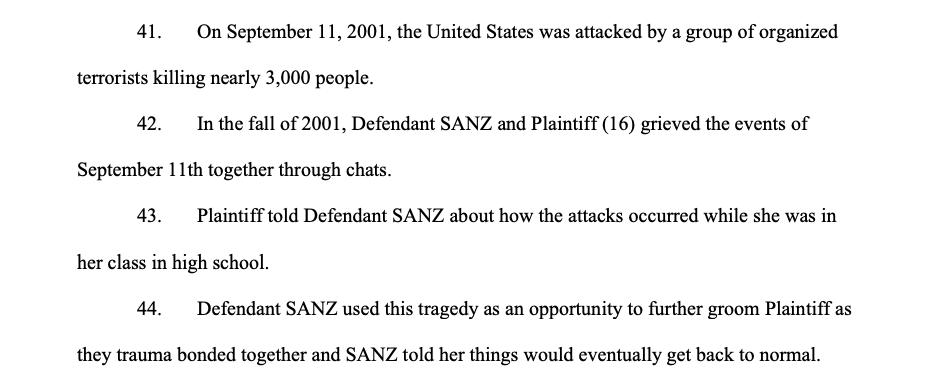
I am obviously a vocal critic of SNL. While I would love to see what litigation reveals about it, I have to imagine that a settlement is much more preferable to the plaintiff than years of painful, public legal proceedings. Should the case go away quietly, it will fall to the rest of us—comedy fans, comedy workers, comedy journalists—to make sure it does not go forgotten. It is all too common in this line of criticism to encounter people, even serious people, who respond that SNL is just a comedy show, it doesn't matter, don't take it too seriously. I have been trying for several years now to shift the popular conceptualization of SNL from "comedy show" to "comedy workplace." This is an almost 50-year-old machine that determines who gets to be rich, famous, and powerful for the rest of their lives. For almost its entire existence it has been run unilaterally by the same person. For decades its employees and former employees have been telling us what a nightmarish hellhole it is. Some have openly admitted the abuse that goes on there, like in the 2008 oral history where Jim Downey and Mike Shoemaker—both on staff when Sanz allegedly groomed a teenager—amusedly described Chris Farley sexually harassing women, which they said wasn't actually sexual harassment because he didn't mean it that way.
Having trouble viewing this tweet? Click here to open original tweet.
It's easy to forget that most of what we know about abuse in Hollywood has come from people who took the Herculean risk of going public, whose stories rarely even get reported if they do not involve numerous survivors alleging undeniably monstrous conduct. This should give us a sense of how little we actually hear. Once we force ourselves to stop measuring SNL by its entertainment value and start centering its function as a workplace, things suddenly get very scary. We're talking about an abuse factory with almost 50 years of untold horror stories involving waitresses, extras, interns, teenage fans—powerless, vulnerable people with no one looking out for them in a world before social media could amplify their voices. The question we have to ask now is the same question we've always had to ask in the wake of these revelations. What else don't we know?
Thank you for reading! This newsletter was free, but making it isn't. If you can, please help keep Humorism going by subscribing for $6/month:
Header image via YouTube/The Tonight Show.

